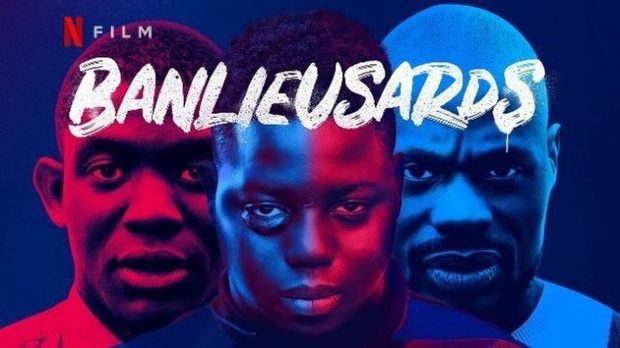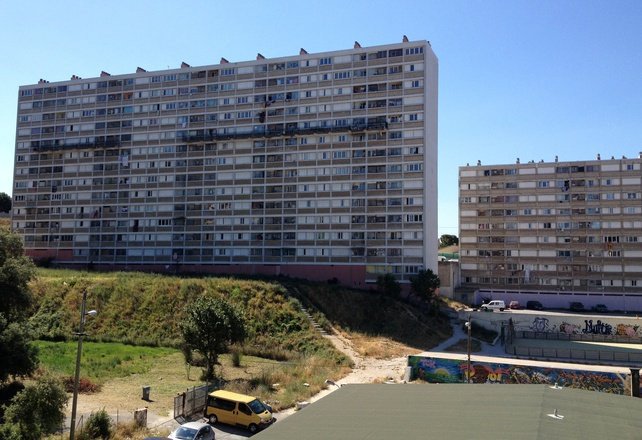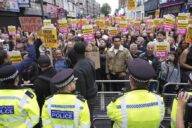Tristan Semiond – FUNCI
On May 18, France celebrated the unexpected return of Karim Benzema to the French national soccer team for Euro 2021. Following this euphoria, the Football Federation unveiled the national team’s anthem, “Ecris mon nom en Bleu, crie mon nom en Bleu” (Write my name in Blue, yell my name in Blue), sung by rapper Youssoupha.
This choice could have fostered a discourse of unity and changed this national atmosphere marked – in the midst of the presidential election campaign – by narratives of hatred and division. However, it had the opposite effect. Youssoupha’s election was instrumentalized by extreme right-wing politicians and by the media that used the traditional rhetoric of the anti-French and anti-white rapper to criticize his selection.
Although rappers are now the most listened to artists in France, their popular successes are not yet synonymous with legitimacy. In fact, rap is still instrumentalized and linked to a mainly black and Arab subversive population, generally living in the suburbs of large urban agglomerations. These simplistic, racist and essentialist views make the choice of a rapper – even more so when it is a racialized person, like Youssoupha – to write and sing a national anthem disturbing to France’s conservative population.
The golden palm for the most disgusting reaction goes once again to Nadine Morano, Member of the European Parliament, who declared on a television program “that he should go back to his country”.
This eagerness to investigate the past, gestures and words of rap artists to justify their exclusion from the public space does not exist when a white singer who does not rap is chosen. How to explain this asymmetry of media treatment and this obsession with presenting the rapper as an “enemy of the nation”?
What is rap?
Rap (rhythm and poetry) was born in the 1970s in the context of the ghettos of New York, mainly in the Bronx, in the wake of the hip-hop movement. The MCs (“Master of ceremony”) began to multiply in all the popular neighborhoods of the United States, starting with the East Coast, with New York as the focal point.
In the beginning, rhythm, music and dance were the main objectives of the DJ and the MC. “in its origin, rap was an alternative type of disco music”[1] as Akhenaton, a member of the Marseille group IAM, explains in an interview.
However, in a context of racism and social tension, many rappers began to tell their daily lives and, in this way, their texts gradually became politicized, as they became the voice of a marginalized reality. This change marked the beginning of a type of rap that we will call “conscious rap”.
The hip-hop and rap movement arrived in France in the early 1980s, and really took off towards the end of the decade through three legendary groups: one from Marseille, IAM, and two from Paris, NTM and Assassin. However, one cannot understand the development and role of rap and its actors without knowing the socio-political and economic context of this period in France.
French rap, the mirror of a society plagued by inequalities
The 1980s and 1990s were a major turning point in French society, during which we left the utopia and frenzy of the 1960s and 80s to enter a period of mass unemployment, the rise of the extreme right, the failures of urban policies and the gradual withdrawal of the welfare state.
In other words, the first French rappers arrived at the end of the so-called “thirty glorious years” (1950-1980) and at the beginning of an era marked by numerous political, economic and social crises.
During the “thirty glorious years”, many neighborhoods were built on the outskirts of large cities in France to accommodate people who came to seek opportunities during this period of economic boom. However, these working-class neighborhoods have gradually undergone spatial, social and political segregation, while the cities have experienced a progressive process of gentrification.
The development of conscious rap in France
This proliferation of inequalities, exclusion from social and political space and the growing link between these neighborhoods (and diversity in general) and crime and insecurity were the triggers that led many French rappers to politicize their texts from the 1990s onwards.
These contemporary poets began to write songs denouncing both the lack of equal opportunities and the rise of racism, as well as the inequalities between the countries of the North and the South:
“Western Europe, the United States, Canada and Australia / Control 80% of the resources vital to human survival / At the same time 100 million Africans are starving to death in the South.”[2] Guerre Nord-Sud (1995) Assassin.
Conscious rap: a popular and grassroots expression
Thus, while the public authorities turn their backs on the young people of the outskirts of the big cities, the lyrics of rap songs resonate with their realities and their aspirations in life. This is the case of the distinguished IAM group’s song “Demain c’est loin (Tomorrow is far away)”:
This song does not only tell the story of “guys sunk by despair who go adrift”[3] but also illustrates and denounces the discourse of otherness of the suburbs and the essentialization of social problems into integration issues:
“Pure product of this infamy / Called the suburbs of Paris / Since I was young, I have gravitated towards the unique goal / Of imposing my presence / […] / And if it’s like this / It’s because for too long / People have turned their backs / On the crucial problems / On the social problems / That asphyxiate the youth ” Le monde de demain[4] (1991) NTM
This struggle for the recognition of social problems has been a recurrent rhetoric in rap. However, there is a lack of will on the part of institutions when it comes to understanding their demands and criticisms, as illustrated by this significant phrase from the group Psy4 de la Rime: “they respond to our SOS with buses of CRS (a police unit)”[5].
Otherness and delegitimization of rappers
One would think that the lyrics of conscious rappers would be understood by the public, the media, and politicians, but this is not the case. Although these artists were among the first racialized people to reach the public sphere in a media landscape that was not very diverse at the time, their emergence reflects the traditional treatment of suburbia and its inhabitants: to alienate and despise.
Invitations on television or radio programs, usually reserved for the promotion of singers’ new releases, become, in the case of rappers, debates in which they have to testify, explain and even imagine solutions to the violence in these neighborhoods, whether or not they originate from them.
This narrative questions their artistic legitimacy and encourages or supports preconceived notions about rap and suburbanites as violent, dangerous, and therefore unable to fit into a so-called “universal norm”[6]. Despite their commercial success, in the eyes of the public, rappers are still perceived as talented but problematic children.
“There the media come in, attack us or flatter us / They insist sometimes in order to better slaughter us / We are forced to defend ourselves, so as not to end up in the slaughterhouse / To answer these accusations which are defamatory / What is the reason for this relentlessness?”[7] La France itinéraire d’une polémique (2001) Sniper.
This question of legitimacy goes beyond the artistic aspect: rappers often do not rely on the legitimacy of any other ordinary citizen, and have to justify their membership in the hegemonic group. Nadine Morano’s phrase quoted in the introduction – “he has to go back to his country” – concisely illustrates this problematic, implying that, because he does not belong to her very narrow vision of “French identity”, France is not his country.
Fostering knowledge to overcome prejudices
This negative narrative driven by the media and politicians has been the subject of numerous deconstructions in many songs. One artist who stands out in this intellectual and discursive exercise is rapper and recent filmmaker Kery James, who transforms the negative connotation of the term “banlieue (suburbs)” with its derivative “Banlieusards (suburbanite)” to be a point of pride as well as an appropriation and enhancement of having a multiple identity:
“We are not condemned to failure, that is the song of the fighters, Banlieusards and proud of it […]”[8] Banlieusards (2008)
This song can also be analyzed as a social anthem for all oppressed people, encouraging them to break out of the spatial and/or mental barriers in which they are trapped. For this, knowledge and the development of a social conscience are the key:
“We are not condemned to failure / For us it is hard, but it must not become an excuse / If knowledge is a weapon, let’s be armed / Because without it we are unarmed”[9] Banlieusards (2008)
His first film, available on Netflix, follows this line and through a debate between two very different characters shows us that nothing is black and white, and that nuances and understanding of the other are the keys to move towards a better future.
This effort to empathize and understand others can take different forms. It can take the form of constructive self-criticism:
“We have ghettos in our heads that make us lonely / How can we change the world if we don’t even show solidarity / We make mistakes but we prefer to blame / And we’ll be content to say that “hell is other”[10]. El infierno son los otros (2012) Youssoupha
Or precisely to break down these mental ghettos in order to build bridges between people and cultures:
“Welcome to our reality / Where the colors mix / No flag disturbs us bro/ Neighborhood kid / No matter where you come from / Who you are / We come to represent”[11] Les cités d’or (2008) Psy4 de la Rime
This set is part of the rhetoric of rappers, who, according to Médine, have several missions:
2Some made me want to know things / And some made me want to sing those things / Some made me want to understand things / When some made me want to yell those things / Do you really know what French rap is? / Not a money machine but a thinking machine”[12] Lecture aléatoire (2006).
Rappers, agents of change against racism
To these objectives can be added another that is part of the pillars of rap: the fight against racism. As part of this fight, a collective of great rappers produced a song in 1997 that has gone down in history: “11’30 contre les lois racistes” (11’30 against racist laws):
“We will never forgive the barbarity of their inhuman laws / A racist state can only create racist laws / So enough of the folkloric and good-natured anti-racism in the euphoria of the holidays / Immediate regularization of all undocumented immigrants and their families / Repeal of all racist laws governing the stay of immigrants in France”[13] 11’30 contre les lois racistes
This fight against racism and discrimination also adopts different perspectives. It can directly denounce racism – structural and daily – as in “11’30 against racist laws”, but it can also spread a message of peace and love:
“Where are the blacks, the whites / The yellows, the greens, the reds and the grays / Far from political amalgams / Welcome to Cosmopolitania (yes) / Show me how you are / Tonight is a day of peace / Show yourself as you are / Tonight no dress code required”[14] Cosmo (2014) Soprano
A postcolonial vision to foster mutual understanding
Many rappers also appropriate history to break with national myths in order to promote a post-colonial memory. This discourse, sometimes perceived as anti-French, explores and deals with subjects that were previously taboo, such as the slave trade, colonization, Franco-African politics or the history of immigration, among others. Thus, they try to find and show the continuities between history and the current situation:
“Ask the Senegalese Tirailleurs and the Harkis / Who took advantage of whom? / The Republic is only innocent in your dreams / And your hands are only white in your lies”[15] Lettre à la République (2012) Kery James
The objective is to propose another vision of both the society in which they live and of history, and thus develop a counter-discourse. This can also be understood as a desire to reappropriate their lives and those of their ancestors, as well as to seek references that are often lacking in school and, more generally, in society:
“On national identity let me be corrected / But did my ancestors really have the face of Vercingetorix?”[16] Espérance de vie (2012) Youssoupha
Precisely, one of the recurring symbols in rap songs is the use of historical characters, but not those of the official history, but those of other histories:
- Frantz Fanon: “I have the same vision of France as Frantz Fanon”.[17]
- Thomas Sankara: “Dad talks to me about Sankara”.[18]
- Patrice Lumumba and Che Guevara, as in the song by Keny Arkana and Monsieur R in which they develop a debate between the two men.
- Ahmad Sah Masud and Malcom X: “From Massoud to Malcolm, from Panjshir to Harlem / The struggle remains the same.”[19]
For this other History to live, it is necessary to express realities and give names to characters and events that, until now, have been silenced. The fact of naming them becomes an “act”, a speech that makes them exist in the public space.
Understanding Islam to put an end to the “clash of civilizations” theories
Understanding our history also enables us to see that the world is made up of exchanges of people, cultures and knowledge. This seems even more necessary today that, at the wake of the French presidential elections, Islamophobic narratives are invading the public space and “securitisation policies on Islam” are being normalised.
In this context, rapper Vin’s wrote three songs entitled “Liberté” (Freedom), “Egalité” (Equality) and “Fraternité” (Fraternity), in which he reflected on how the beloved motto of the French Republic, and how it does not correspond to the realities of millions of citizens, even more so when they are Muslims.
“The press only talks about Islam, that’s the control of the masses / Guilty and victim, I see the roles reversed, hatred pouring out / Talking about the Koran without even knowing a sura”[20] Fraternité (2019) Vin’s
The over-mediatisation, the TV shows with experts – usually white non-Muslim men –and the political discourses that make of Islam (and, therefore, of immigration) the cause of all society’s problems fuel the lyrics of the French conscious rap:
“In the middle of an economic crisis, we need someone to blame / And it’s towards the Muslims that all your blows are directed / I’m not afraid to write it, France is Islamophobic / And nobody hides from it in the France of xenophobes”[21] Lettre à la République (2012) Kery James.
In addition to condemning discrimination, these songs also spread Islamic values such as peace, modesty, or solidarity to show that there are no antagonistic religions and cultures, and that, in any case, the solution is found in interculturality: “we no longer have a choice and / we must live or die together”[22] Vivre ou mourir ensemble (2016) Kery James.
Abd al Malik, rapper and author of the book Qu’Allah bénisse la France[23] (May Allah bless France), has been fighting for years for a universal love that reflects that “God did not make differences so that we could confront each other. Cultures are something rich that allows us to get to know each other”.
In conclusion, we can say that rappers play with words both to denounce their social situation and to promote coexistence. They play a very important role in our societies, which are characterised by hatred and division, because they create spaces in which people have the possibility to reflect on their situations and their social environment. In this light, they promote change and mutual understanding.
They are what Amin Maalouf describes as: “those borderline beings, in a certain sense, crossed by ethnic, religious or other fracture lines […] who have a role to play in weaving ties, dissipating misunderstandings […] and who have a vocation to be links, bridges, mediators between various communities, various cultures”[24].
[1] https://www.youtube.com/watch?v=oMjyL8l0b58
[2] « L’Europe occidentale, les Etats-Unis, le Canada et l’Australie, Contrôlent 80% des ressources vitales pour la survie de l’Homme. Parallèlement 100 millions d’Africains meurent de faim au Sud du globe.» Guerre Nord-Sud (1995) Assassin.
[3] « Des mecs coulés par le désespoir qui partent à la dérive » Demain c’est loin (1997) IAM
[4] « Pur produit de cette infamie / Appelée la banlieue de Paris / Depuis tout jeune je gravite avec le but unique/ D’imposer ma présence / […] / Et si cela est comme ça / C’est que depuis trop longtemps / Les gens tournent le dos / Aux problèmes cruciaux / Aux problèmes sociaux / Qui asphyxient la jeunesse » Le monde de demain (1991) NTM
[5] « Ils répondent à nos SOS, avec des cars de CRS » Justicier, Psy4delaRime – Alonzo (2005)
[6] Karim Hammou. « Quarante ans de rap français : identités en crescendo ». Cresppa-CSU, 2020.
[7] « Là les médias entrent en piste, nous attaquent ou nous flattent / Ils insistent parfois afin de mieux nous abattre / Nous sommes forcés de nous défendre, pour ne pas finir à l’abattoir /De répondre à ces accusations qui sont diffamatoires / Va savoir à quoi cet acharnement est dû ? » La France itinéraire d’une polémique (2001) Sniper
[8] « On n’est pas condamné à l’échec, voilà l’chant des combattants Banlieusard et fier de l’être […] » Banlieusards (2008) Kery James
[9] « On n’est pas condamnés à l’échec / Pour nous c’est dur, mais ça ne doit pas devenir un prétexte / Si le savoir est une arme, soyons armés / Car sans lui nous sommes désarmé » Banlieusards (2008) Kery James
[10] « On a des ghettos dans la tête qui nous rendent solitaires / Comment changer le monde si on n’est même pas solidaires? / On fait des erreurs mais on préfère rejeter la faute / Et on se contentera de dire que “l’enfer c’est les autres » L’enfer c’est les autres (2012) Youssoupha.
[11] « Bienvenue dans notre décor / Où les couleurs ce mélangent / Aucun drapeau nous dérange fréro / Enfant d’quartier / Peu importe d’où tu viens / Qui tu es / On vient représenter » Les cités d’or (2008) Psy4 de la Rime.
[12] « Certains m’ont donné envie de connaître des choses / Et d’autres m’ont donné envie de chanter ces choses / Certains m’ont donné envie de comprendre les choses / Quand d’autres m’ont donné envie de gueuler ces choses / Sais-tu vraiment ce qu’est le rap français? / Pas une machine à sou mais une machine à penser » Lecture aléatoire (2006) Médine.
[13] « Nous ne pardonnerons jamais la barbarie de leurs lois inhumaines / Un état raciste ne peut que créer des lois racistes / Alors assez de l’anti-racisme folklorique et bon enfant dans l’euphorie des jours de fête / Régularisation immédiate de tous les immigrés sans papiers et de leurs familles / Abrogation de toutes les lois racistes régissant le séjour des immigrés en France » (1997)
[14] « Où sont les blacks, les blancs / Les jaunes, les verts, les rouges et les gris / Loin des amalgames politiques / Bienvenue en Cosmopolitanie (oui) / Montre-moi comme tu es / Ce soir est un jour de paix / Montre-toi comme tu es / Ce soir pas de tenue exigée » Cosmo (2014) Soprano.
[15] « Demandez aux tirailleurs sénégalais et aux harkis / Qui a profité d’qui? / La République n’est innocente que dans vos songes / Et vous n’avez les mains blanches que dans vos mensonges » Lettre à la République (2012) Kery James.
[16] « Sur l’identité nationale qu’on me corrige / Mais mes ancêtres avaient-ils vraiment la gueule de Vercingétorix? » Espérance de vie (2012) Youssoupha.
[17] « J’ai la même vision de la France, que Frantz Fanon » Jeux vidéos et débats (2019) Nekfeu
[18] Papa me parle de Sankara, jeune babtou traîne qu’avec Arabes » Cheum (2019) Nekfeu
[19] « De Massoud à Malcom, du Panjshir à Harlem / Le combat reste le même » Du Panjshir à Harlem (2005) Médine
[20] « On parle que d’Islam dans la presse, ça c’est le contrôle des masses / Coupable et victime, j’vois les rôles s’inverser, la haine s’déverser / Parlent du Coran sans même connaître un verset » Fraternité (2019) Vin’s.
[21] « En pleine crise économique, il faut un coupable / Et c’est en direction des musulmans que tous vos coups partent / J’n’ai pas peur de l’écrire, la France est islamophobe / D’ailleurs plus personne ne s’en cache dans la France des xénophobes » Lettre à la République (2012) Kery James
[22] « Vivre ou mourir ensemble » Kery James (2016)
[23] Abd al Malik. « Qu’Allah bénisse la France ». Albin Michel, 1998. 230p.
[24] Amin Maalouf. « Les identités meurtrières » Editions Grasset & Fasquelle. 1998. P.11.
















No Comments